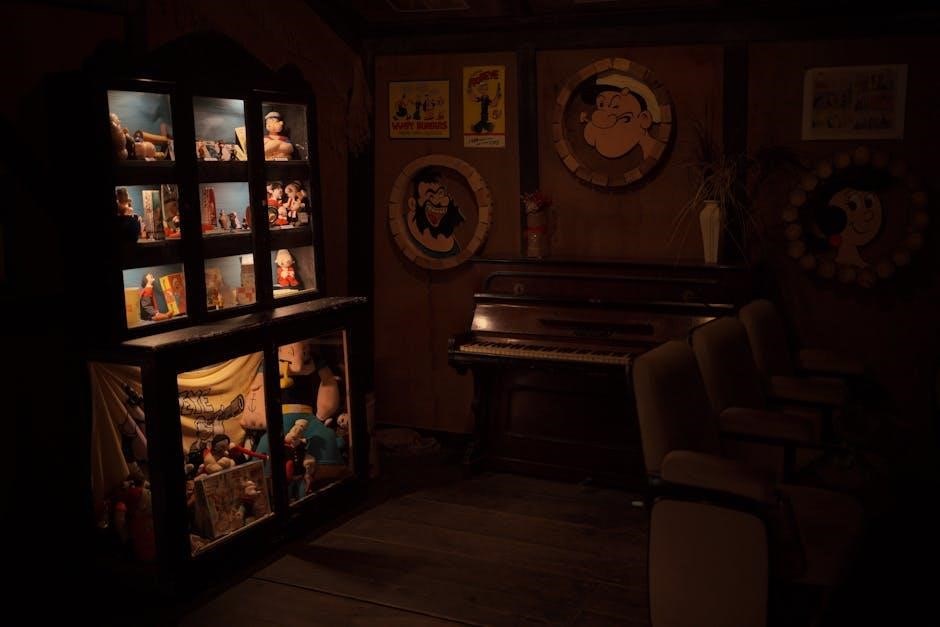Poems of the Decade is a landmark anthology showcasing over 100 poems from the Forward Prizes for Poetry, spanning 2001-2010. It captures the essence of contemporary poetry, offering diverse voices and styles that reflect themes of love, loss, violence, and identity. This collection is a vital resource for understanding the evolution of modern poetry.
Overview of the Collection
Poems of the Decade is an anthology that gathers over 100 poems from the Forward Prizes for Poetry, submitted between 2001 and 2010. This collection highlights the diversity of contemporary poetry, featuring works by both established and emerging poets. It serves as a comprehensive introduction to the themes, styles, and linguistic innovations of the 21st century. The anthology is widely used in educational settings, particularly for A-Level studies, with accompanying resources like commentaries and analysis to aid deeper understanding. Its scope captures the emotional depth and creative experimentation that define modern poetry.
Historical Context of the Forward Prizes for Poetry
The Forward Prizes for Poetry, established in 1992, are among the most prestigious poetry awards globally. The anthology Poems of the Decade reflects the first decade of the 21st century, showcasing works from 2001 to 2010. This collection highlights the evolution of contemporary poetry, featuring over 100 poems selected from thousands of submissions. The prizes have historically recognized both established and emerging poets, celebrating diverse themes and styles. This anthology captures the essence of poetic innovation during this period, offering insights into the cultural and literary shifts that defined the early 21st century.

Key Poets and Their Contributions
Poets like Patience Agbabi, Simon Armitage, and Carol Ann Duffy shine in Poems of the Decade, offering unique perspectives on identity, culture, and contemporary themes through their innovative styles.
Patience Agbabi: Exploring Identity and Culture
Patience Agbabi’s poetry in Poems of the Decade delves into themes of identity and culture, blending personal narrative with broader societal issues. Her work, such as “Eat Me,” uses provocative imagery and direct language to explore themes of identity, agency, and cultural displacement. Agbabi’s unique voice challenges traditional notions of self, offering a fresh perspective on multicultural experiences. Her poetry is both deeply personal and universally relatable, making her a standout contributor to the anthology.
Simon Armitage: Contemporary Themes and Styles

Simon Armitage’s contributions to Poems of the Decade highlight his mastery of contemporary themes and stylistic innovation. His poetry often explores human conflict, nature, and personal reflection, blending wit with profound insight. Armitage’s use of vivid imagery and accessible language makes his work both relatable and thought-provoking. Poems like “Chainsaw Versus the Pampas Grass” showcase his ability to juxtapose the mundane with the sublime, creating a unique narrative voice. His work bridges the gap between individual experience and broader societal concerns, solidifying his reputation as a leading voice in modern poetry.
Carol Ann Duffy: Feminist Perspectives and Imagery
Carol Ann Duffy’s poetry in Poems of the Decade offers powerful feminist perspectives, exploring themes of identity, love, and societal expectations. Her vivid imagery and evocative language create compelling narratives, often centered on strong female figures. Duffy’s work challenges traditional gender roles and delves into the complexities of human relationships. Her use of metaphor and symbolism adds depth to her exploration of personal and political themes. Through her unique voice, Duffy invites readers to reflect on the intersections of power, memory, and emotion, making her contributions to the anthology both provocative and unforgettable.

Themes and Motifs in the Anthology
The anthology explores themes of love, loss, and memory, alongside violence, danger, and fear, reflecting the human experience. Poets like Agbabi and Armitage use vivid imagery to convey emotional depth.
Love, Loss, and Memory

The anthology delves into universal themes of love, loss, and memory, with poets like Patience Agbabi and Simon Armitage crafting evocative portrayals of personal and collective experiences. Through intimate imagery and reflective language, these poems explore the fragility of relationships, the ache of longing, and the enduring power of remembrance. Works such as Agbabi’s Eat Me and Armitage’s nuanced reflections on love and absence illustrate how memory shapes identity and emotional landscapes. These poems resonate deeply, offering readers a mirror to their own experiences of affection, sorrow, and the passage of time.
Violence, Danger, and Fear
The anthology explores themes of violence, danger, and fear through haunting imagery and evocative language. Poets like Simon Armitage and Patience Agbabi tackle these subjects with unflinching honesty, reflecting on personal and societal struggles. Armitage’s work often examines the tension between human fragility and external threats, while Agbabi’s poetry delves into cultural and identity-based conflicts. These poems employ broken language forms and expansive syntax to convey the chaos and unpredictability of violence. Together, they create a powerful narrative that challenges readers to confront and understand these darker aspects of human experience. The emotional resonance lingers, leaving a lasting impact.
Childhood to Adulthood: Transition and Growth
Poets in the anthology vividly explore the journey from childhood to adulthood, capturing the complexities of growth and self-discovery. Julia Copus’s An Easy Passage reflects on the fragility of youth, while Thomas Hood’s nostalgic recollections highlight the loss of innocence. Through evocative imagery and intimate language, these poems portray the emotional and psychological shifts that define this transition. The anthology reveals how poets navigate the tension between retrospection and forward momentum, offering profound insights into the universal human experience of maturation and the enduring impact of early memories on adult life. This theme resonates deeply, inviting readers to reflect on their own journeys.
Literary Devices and Techniques
The anthology features ekphrasis, broken language forms, and expansive syntax, creating vivid imagery and emotional depth. Poets employ these techniques to explore contemporary themes and evoke powerful responses.
Ekphrasis and Connected Poems
Ekphrasis, a literary device describing artworks, is prominently featured in the anthology. Poets like Patience Agbabi and Simon Armitage craft vivid, sensory details, transforming visual into verbal. Connected poems explore shared themes or narratives, such as identity and memory. These techniques create a rich tapestry of meaning, inviting readers to engage deeply with the poems’ emotional and cultural contexts. The use of ekphrasis and connected forms underscores the anthology’s contemporary relevance and its ability to resonate with diverse audiences. This approach enhances the exploration of universal themes through innovative storytelling methods.
Broken and Reshaped Language Forms

Poets in the anthology often experiment with fragmented and reshaped language, reflecting the complexity of modern experiences. Techniques like fractured sentences and unconventional structures disrupt traditional forms, creating vivid imagery and emotional depth. This stylistic innovation challenges readers to engage actively, mirroring the chaos and beauty of contemporary life. The use of broken language forms emphasizes themes of identity, memory, and violence, offering fresh perspectives on universal human struggles. These poetic innovations redefine storytelling, making the anthology a benchmark for contemporary literary expression and its ability to evoke powerful emotional responses.
Syntax and Expansive Structures
Poets in the anthology frequently employ expansive syntax and complex structures to convey intricate emotions and ideas. These techniques allow for layered narratives and explorations of identity, memory, and violence. By extending sentence structures, poets create a sense of flow and continuity, drawing readers into their worlds. Expansive syntax also enables the blending of personal and universal themes, making the poetry both deeply individual and broadly relatable. This approach reflects the anthology’s focus on innovation and its ability to capture the dynamic nature of contemporary life through bold and expressive linguistic forms.
Significance of the Forward Prizes
The Forward Prizes are among the world’s most prestigious poetry honors, celebrating exceptional works and recognizing both emerging and established poets. They play a pivotal role in shaping contemporary poetry.
Impact on Contemporary Poetry
The Forward Prizes have significantly influenced contemporary poetry by showcasing diverse voices and innovative styles. Poems of the Decade highlights themes of violence, danger, and fear, alongside love and its complexities, through broken and reshaped language forms. This anthology has become a benchmark for understanding modern poetry, encouraging poets to experiment with form and language. By celebrating both established and emerging poets, the Forward Prizes have elevated the status of poetry, making it more accessible and recognized globally. This collection reflects the dynamic evolution of poetry in the 21st century, setting a standard for literary excellence and innovation.
Recognition of Emerging and Established Poets
The Forward Prizes have played a pivotal role in recognizing both emerging and established poets, providing a platform for diverse voices to be heard. The Poems of the Decade anthology exemplifies this by featuring works from renowned poets like Simon Armitage, Carol Ann Duffy, and Patience Agbabi, alongside lesser-known talents. This balance ensures that the anthology not only celebrates accomplished writers but also nurtures new poetic talent. By highlighting their contributions, the Forward Prizes foster a vibrant literary community, ensuring that poetry remains a dynamic and inclusive art form.
Educational and Analytical Approaches
The anthology is widely used in educational settings, offering rich material for analysis. It provides study guides and resources, enabling students to engage deeply with contemporary poetry.
Teaching the Anthology in Classrooms
Teachers use Poems of the Decade to introduce students to contemporary poetry, leveraging its diverse themes and styles. The anthology aligns with A-Level curricula, offering study guides, biographies, and analysis to enhance understanding. Educators emphasize comparing unseen poems to anthology pieces, fostering analytical skills. Poets like Patience Agbabi and Simon Armitage provide rich material for exploring identity, memory, and social themes. The anthology’s structured format, including commentaries, supports classroom discussions and independent study, making it an invaluable resource for teaching modern poetry and preparing students for exams.
Comparative Analysis of Poems
Poems of the Decade encourages comparative analysis, with its diverse range of voices and themes. Students often compare works like Patience Agbabi’s exploration of identity in Eat Me with Simon Armitage’s reflections on memory in Chainsaw Versus the Pampas Grass. This approach highlights contrasts in style, tone, and thematic focus. The anthology’s structured format, including commentaries, aids in identifying poetic devices like imagery, syntax, and language use. Such comparisons deepen understanding of contemporary poetry’s complexity and its ability to address universal and personal experiences through varied forms and perspectives.

No Responses